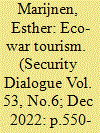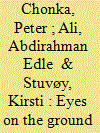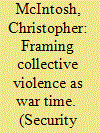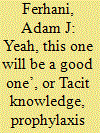|
|
|
Sort Order |
|
|
|
Items / Page
|
|
|
|
|
|
|
| Srl | Item |
| 1 |
ID:
188858


|
|
|
|
|
| Summary/Abstract |
This article introduces ‘eco-war tourism’, a growing niche in which tourists venture into war zones to seek adventure and ‘save’ nature from its violent surroundings. In Virunga National Park in eastern Democratic Republic of Congo, such tourists can experience the ‘threat of mortality’ while visiting mountain gorillas, contribute to the survival of the park and supposedly participate in regional peacebuilding. This article considers how the amalgamated commodification of war and gorillas leads to the bunkerization of tourism, the reconfiguration of space into ‘safe’ and ‘dangerous’ areas and the militarization of conservation. It links critical security studies and political ecology to theorize how eco-war tourism intensifies green militarization and how militarized conservation itself becomes a spectacularized tourist attraction. Eco-war tourism is informed by, and productive of, various affective geographies, entrenched in colonial durabilities that produce Eurocentric ideas about how and by whom nature should be protected. I call for critical security studies to examine how diverse security interventions – e.g. military, tourism, humanitarianism and conservation – are entangled in and reconfigure inherently political nature–society relations and underscore the futility of approaching ‘society’ and ‘the environment’ as separate fields of security.
|
|
|
|
|
|
|
|
|
|
|
|
|
|
|
|
| 2 |
ID:
188859


|
|
|
|
|
| Summary/Abstract |
This article reflects on the use of narrative interviews alongside participatory and remote-access visual methods to produce knowledge on and in conflict-affected settings. It details our iterative and reactive experiences of navigating transnational academic, policy and humanitarian networks to attempt to undertake ethical research on the security experiences of displaced people in Somali cities and facilitate their engagement with policymakers. We explore tensions in the combined use of increasingly accessible digital tools (camera-equipped smartphones and open-access satellite imagery) in facilitating a participatory, narrative-based approach to security research while also mitigating access limitations to research sites. We argue that a holistic and reflexive approach to everyday security within a technologically mediated data-collection process – for both researchers and research participants – not only is important for negotiations around ethical fieldwork, but also can be generative of findings about the research site itself. Methods are not brought into a context and deployed by researchers in ways that are fully under their control. In the case explored here, how the researchers and research participants engaged in dialogue about various methods, reflected their connections within networks of knowledge production dominated by humanitarian donors/partners, while also highlighting important aspects of displaced people’s everyday experiences of (in)security and marginalization in Somali cities.
|
|
|
|
|
|
|
|
|
|
|
|
|
|
|
|
| 3 |
ID:
188856


|
|
|
|
|
| Summary/Abstract |
Writing on the US war on terrorism, Judith Butler identified how discursive frames are produced and reproduced in ways that make certain forms of violence discernable as war. These frames that make war an intelligible form of political violence are not only spatial, but irreducibly temporal in nature. Their circulation–e.g., the framing of US counter-terror efforts as ‘war’ – enables some lives to be understood as grievable, while others lack political and normative value. These frames not only determine what is and is not a war, but whose deaths represent an unremarkable facet of peacetime. This article explores one instance where the circulation of these frames had the potential for rupture – the 2016 shooting at the Pulse nightclub in Orlando. First, it use the event’s liminal status as a ‘terrorist attack’ to make visible the frame(s) operating in the contemporary US political present to render certain acts of violence intelligible as political violence, terrorism, or war. Second, it explores the temporal dimension of these frames, showing how they function together within national security narratives to authorize certain forms of violence as exceptional. This article concludes by exploring the potential for ‘timing’ this violence differently as a means of political resistance.
|
|
|
|
|
|
|
|
|
|
|
|
|
|
|
|
| 4 |
ID:
188857


|
|
|
|
|
| Summary/Abstract |
The World Bank has asserted a dominant role in post-conflict peacebuilding and during war itself. This article critiques the World Bank’s evolving approach to war and peace through both a qualitative analysis of recent strategic documents and a case study of the Bank’s engagement in Ukraine during the war in Donbas. I identify three prominent themes that inform the World Bank’s evolving strategy for engaging in conflict-affected conditions, which may impact the possibilities for peace, whether conceptualized as negative, positive or a feminist peace. First, the rhetorical importance of governance is concretized to emphasize business solutions to economic and political problems; second, the conflict-affected population is reimagined in terms of human capital, emphasizing entrepreneurship and resilience; and third, private capital is presented as a saviour. I argue that, in practice, these imperatives lead to a further withdrawal of the state when social assistance and protection are most needed, the instrumentalization of the conflict-affected populace as receptacles of resilience and vassals of economic growth, and an emphasis on private capital as the principal social group to the exclusion of real people. I conclude by questioning whether World Bank reforms during conflict can positively contribute to peace.
|
|
|
|
|
|
|
|
|
|
|
|
|
|
|
|
| 5 |
ID:
188855


|
|
|
|
|
| Summary/Abstract |
Approaching health security from a practice-theoretical perspective, this article advances our understanding of the everyday and locality in health security decisionmaking, and is guided by the following two questions: How is it determined when a health security threat is likely to be present at a point of entry? What knowledge informs everyday health security decisions at borders? Markedly little is known about health security decisionmaking, though conventional wisdom tells us that health security decisions are based on stringent processes and – importantly – anchored in epidemiological knowledge. The assumed primacy of epidemiological knowledge in health security decisionmaking is well illustrated by the SARS-CoV-2 pandemic: evidence-based responses emerged globally following sophisticated epidemiologic investigation. Are health security decisions always rooted in epidemiology? A 12-month period of non-participant observation of Port Health Officers – who, under the auspices of the 2005 International Health Regulations, are responsible for numerous prophylactic measures at the UK border – gives a unique, privileged entry point for understanding the health security decisionmaking process and tells a story that both questions the centrality of epidemiology and foregrounds the role of tacit knowledge and intuition in health security decisionmaking. This article, which draws on insights from the science and technology studies literature on tacit knowledge, shows how observed health risk taxonomies and corollary decisions in prophylactic border security are predicated almost exclusively on hunches and ‘just knowing’ that something ‘doesn’t feel right’.
|
|
|
|
|
|
|
|
|
|
|
|
|
|
|
|
|
|
|
|
|